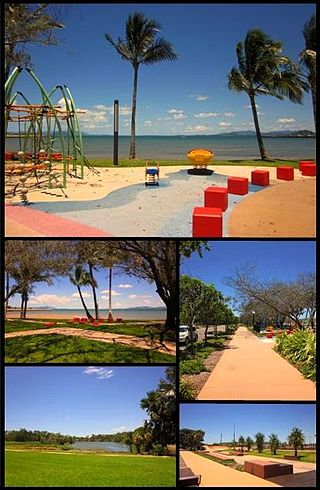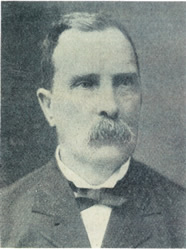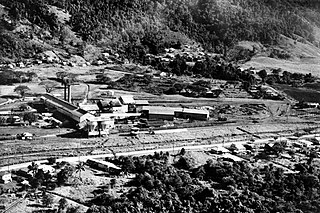
Bowen is a coastal town and locality in the Whitsunday Region, Queensland, Australia. In the 2021 census, the locality of Bowen had a population of 11,205 people.

The Flinders Highway is a highway that crosses Queensland east to west, from Townsville on the Pacific coast to Cloncurry. The road continues as the Barkly Highway from Cloncurry to the Northern Territory border at Camooweal and beyond. The Flinders Highway passes a number of small outback towns and typical outback landscape predominates towards the inland. It was known as National Route 78 before Queensland began to convert to the alphanumeric system being adopted in Australia and is now designated as A6. The highway is also known as Overlanders Way. Its entire length is part of the National Land Transport Network.

Port of Townsville is a government-owned Corporation and seaport in Townsville, Queensland, Australia. It is the third largest seaport in Queensland after Port of Brisbane and the Port of Gladstone. It is located south of the mouth of Ross Creek and north of the Ross River. Main shipping access is through Cleveland Bay. A second seaport, which only exports sugar is found about 100 kilometres (62 mi) north of Townsville at Lucinda and is also managed by Port of Townsville Limited.

Idalia is a southern suburb in the City of Townsville, Queensland, Australia. In the 2021 census, Idalia had a population of 4,563 people.

Robert Christison was a pastoralist in Australia.

The Ross River Meatworks Chimney is a heritage-listed abattoir at Stuart Drive, Idalia, City of Townsville, Queensland, Australia. It is the 11th tallest structure in Townsville. It was built as part of the Ross River Meatworks in 1891 William McCallum Park and is now a major landmark as part of Fairfield Waters and part of Lancinis Springbank urban village. It was listed on the Queensland Heritage Register on 14 August 2009.

Nome is a rural locality in the City of Townsville, Queensland, Australia. In the 2021 census, Nome had a population of 990 people.

Boiling down was the term used in Australia for the process of rendering the fat from animal carcasses to produce tallow. It was a common activity on farms and pastoral properties to produce tallow to be made into soap and candles for domestic use.

Alligator Creek is a rural locality in the City of Townsville, Queensland, Australia. In the 2021 census, Alligator Creek had a population of 1,550 people.

Meatworks and Wharf Site is a heritage-listed former abattoir and wharf at Settlement Road, St Lawrence, Isaac Region, Queensland, Australia. It was built from 1870s to 1890s. It is also known as Broadsound Meat Company, Broadsound Packing Co Ltd, and Newport Meatworks Company. It was added to the Queensland Heritage Register on 23 February 2001.

Cleveland Bay is a bay on the north-eastern coast of Queensland, Australia. It is part of the Coral Sea and, administratively, is within the City of Townsville.

James Brennan was a member of the Queensland Legislative Assembly.

Boiling Down Works is a heritage-listed boiling down works at Truganinni Road, Burketown, Shire of Burke, Queensland, Australia. It was built from 1891 to 1901. It was added to the Queensland Heritage Register on 21 August 1992.
Nelson Brothers Limited meat processors and importers was incorporated in London in 1883 to purchase as of 1 July 1883 the meat works at Tomoana, Hawkes Bay. These boiling down and canning works erected in 1880 were run as Nelson Brothers and Co by William Nelson, his brother Frederick Nelson (1839–1908) and their partner, J N Williams later of Frimley, Hastings.

Vestey's Meatworks, officially the North Australia Meat Company, was a slaughterhouse in Darwin, Northern Territory, Australia, built by Vestey Brothers between 1914 and 1917. Never profitable, it operated for three years before the company abandoned the venture in the aftermath of the Darwin rebellion. Most of the facility was demolished in 1957, but two large water tanks remain standing today, on what is now the site of the Darwin High School on Bullocky Point in the suburb of The Gardens. The beach to the north of Bullocky Point is called Vestey's beach as a result of the meatworks.

The Babinda Sugar Mill was a sugar mill that operated in Babinda, Queensland, Australia from 1915 to 2011. The site of the mill is owned by MSF Sugar and is located next to the Bruce Highway.
Yacamunda Station is a historic cattle station in North Queensland near Bowen. In 1935 it was one of the largest cattle stations in the state and played a significant part in the growth and development of early Australia. It was later sold in 2007 as a functioning cattle station. Historical references and photos are available for reference.
The Bowen Meatworks, also called the Merinda Meatworks or Bowen Freezerworks was an important business to the foundation of the economy of Bowen, Queensland, Australia since 1894.
The Lyndhurst pastoral station in Lyndhurst, North Queensland was originally referred to as “the Lyndhurst run” and often referred to as Lyndhurst Station. It was established in approximately 1863 by Mr Barnes and John Fulford. The property bred prize-winning Hereford cattle and has an important place in Australia's early history. The Station still operates as a cattle station today under the management of the Welcome Downs Cattle Co.














